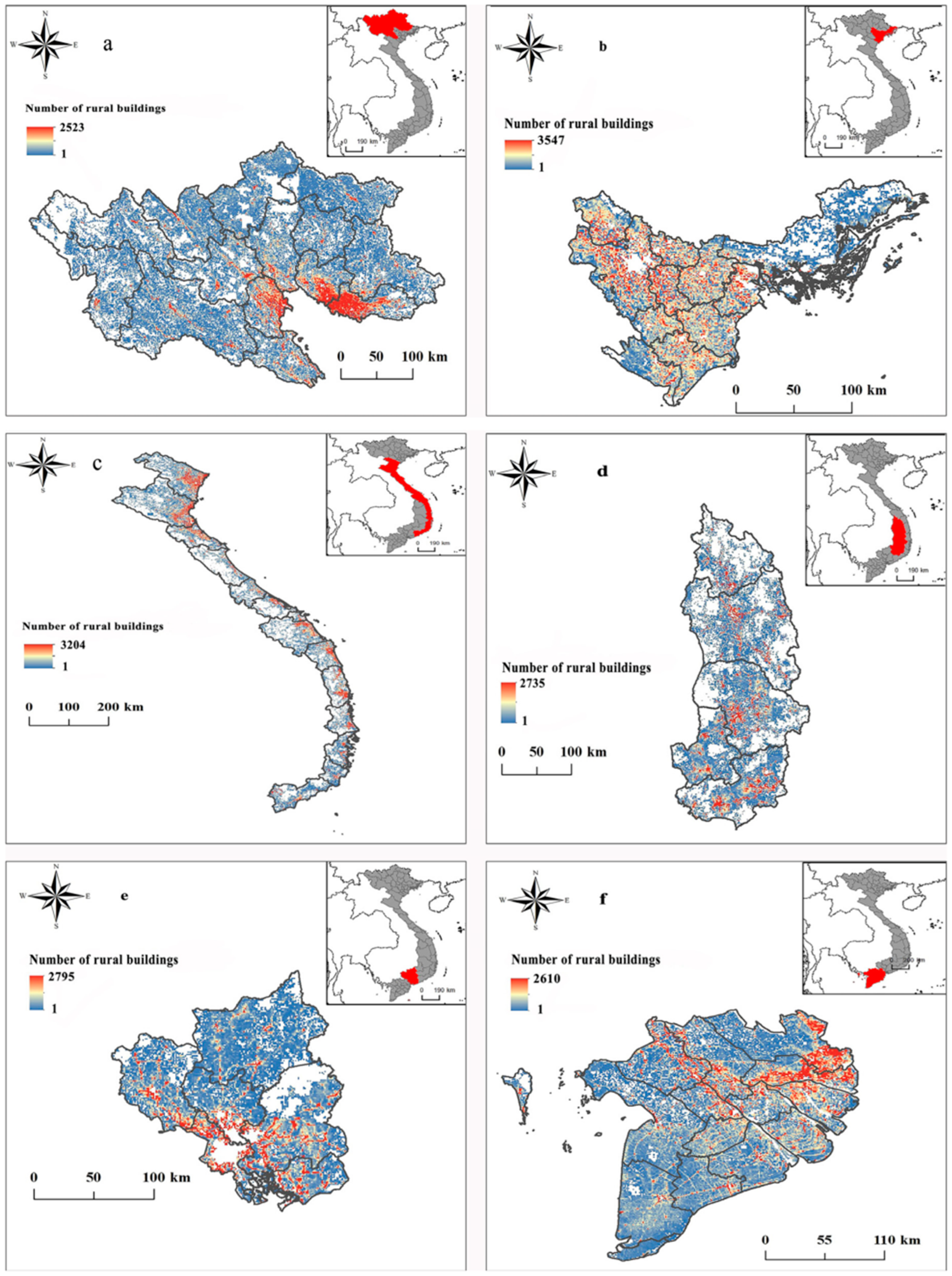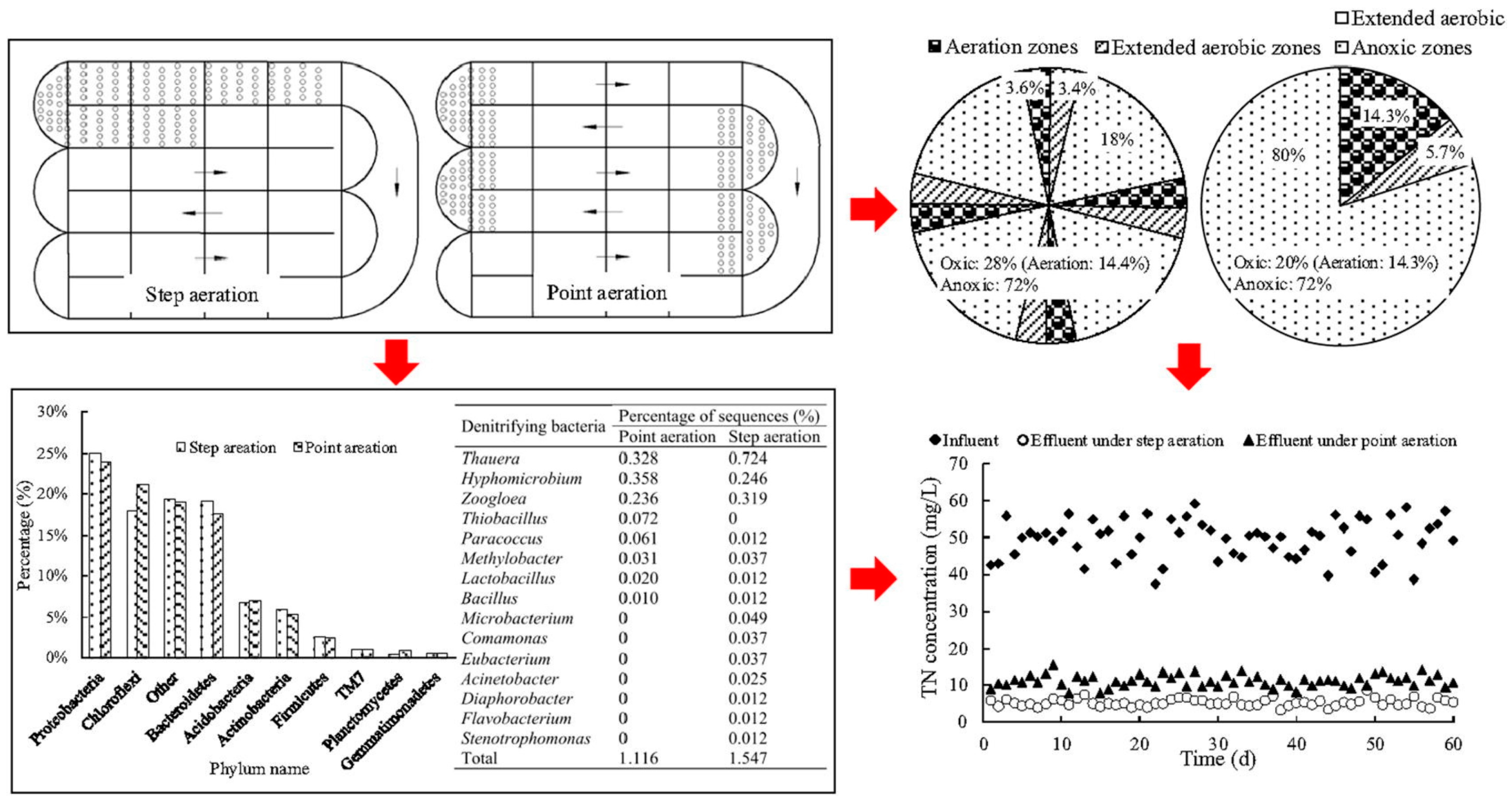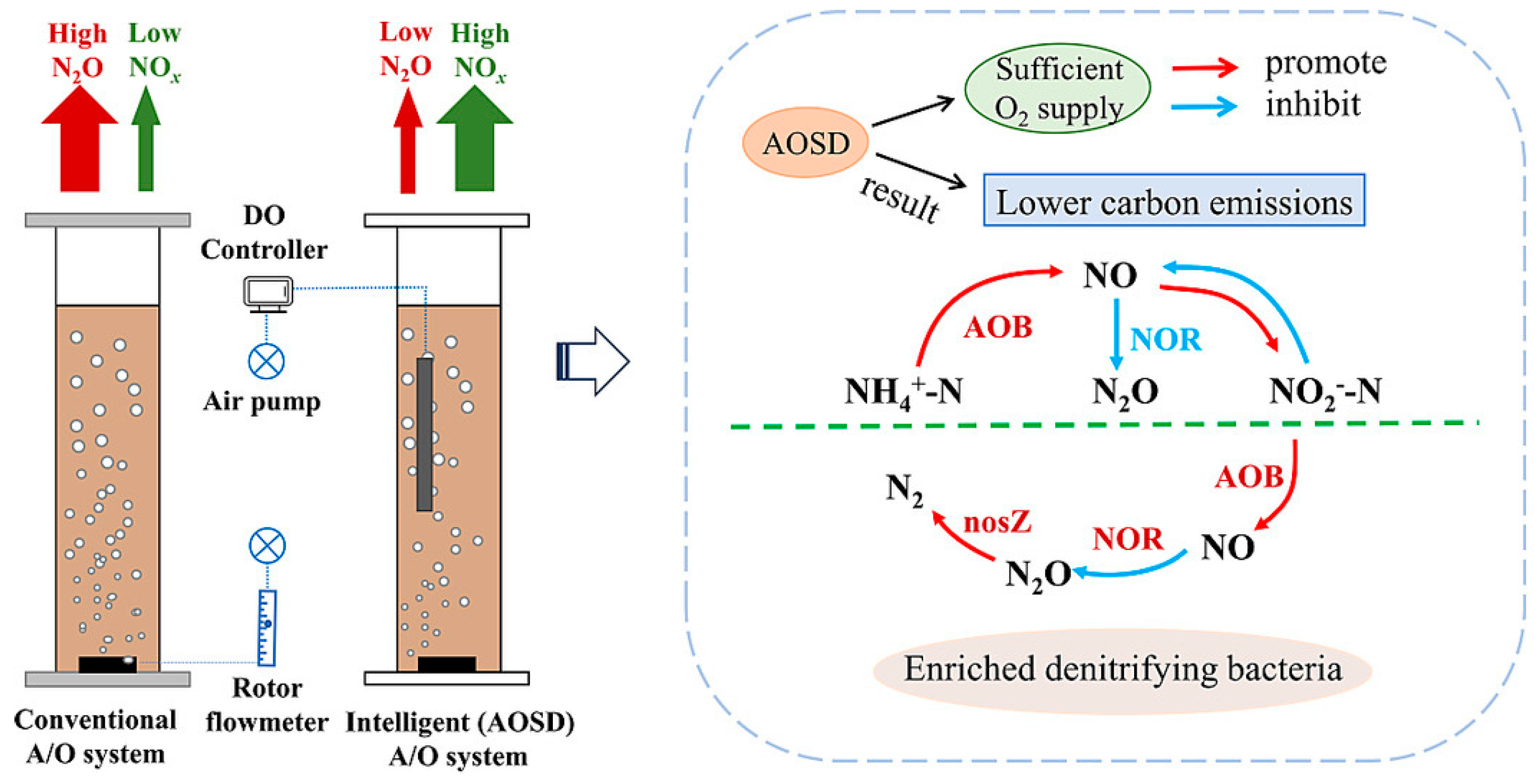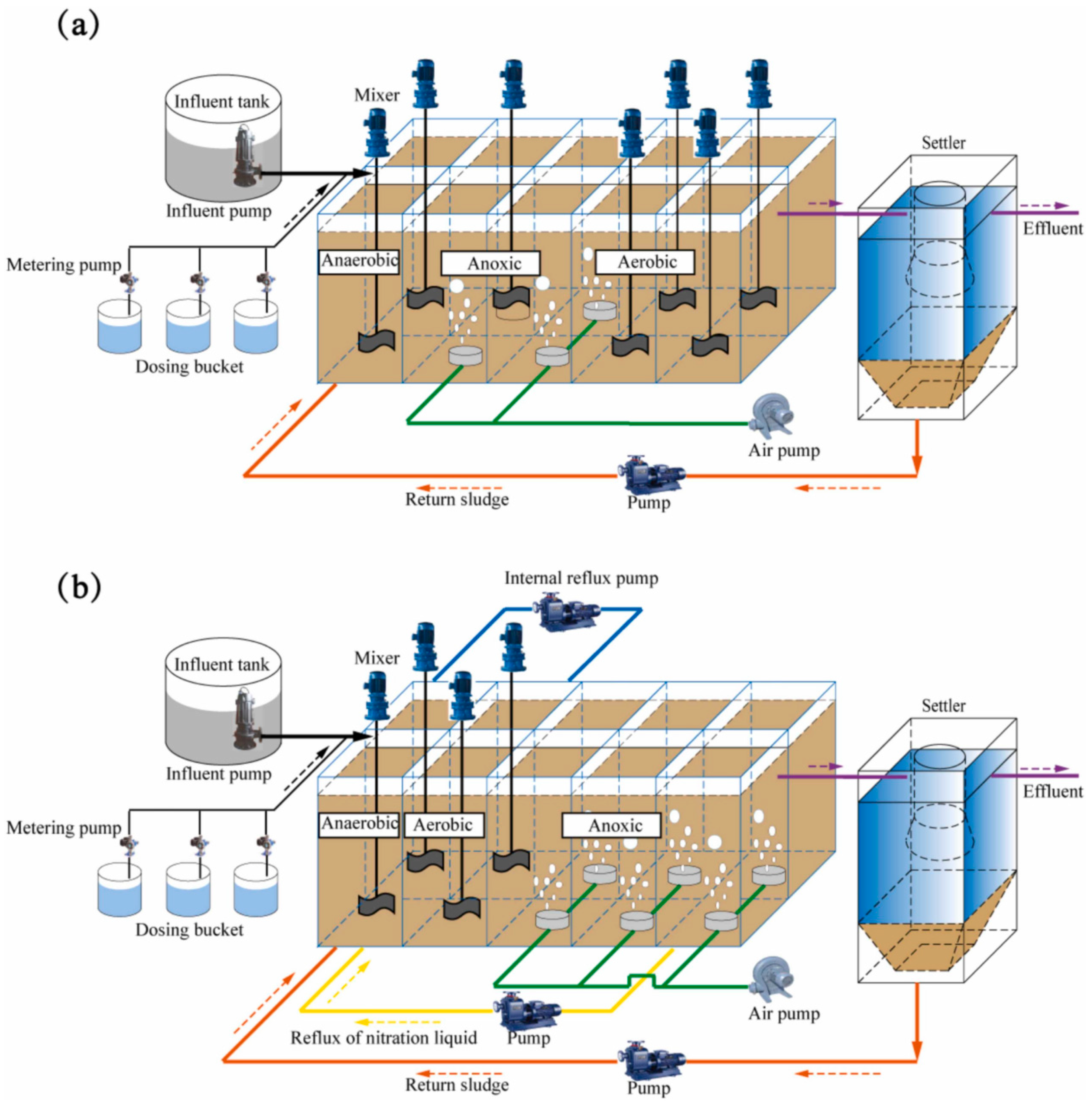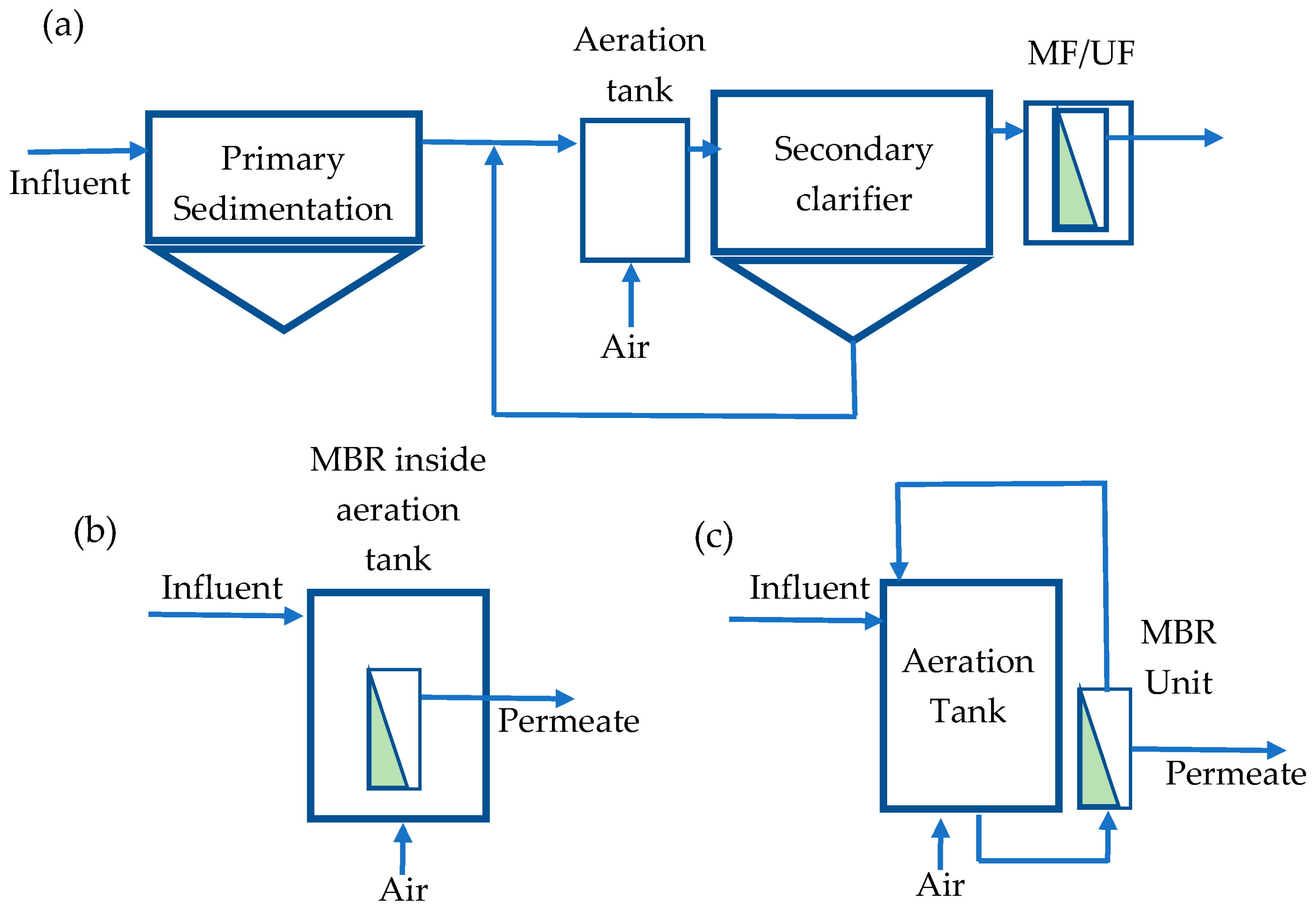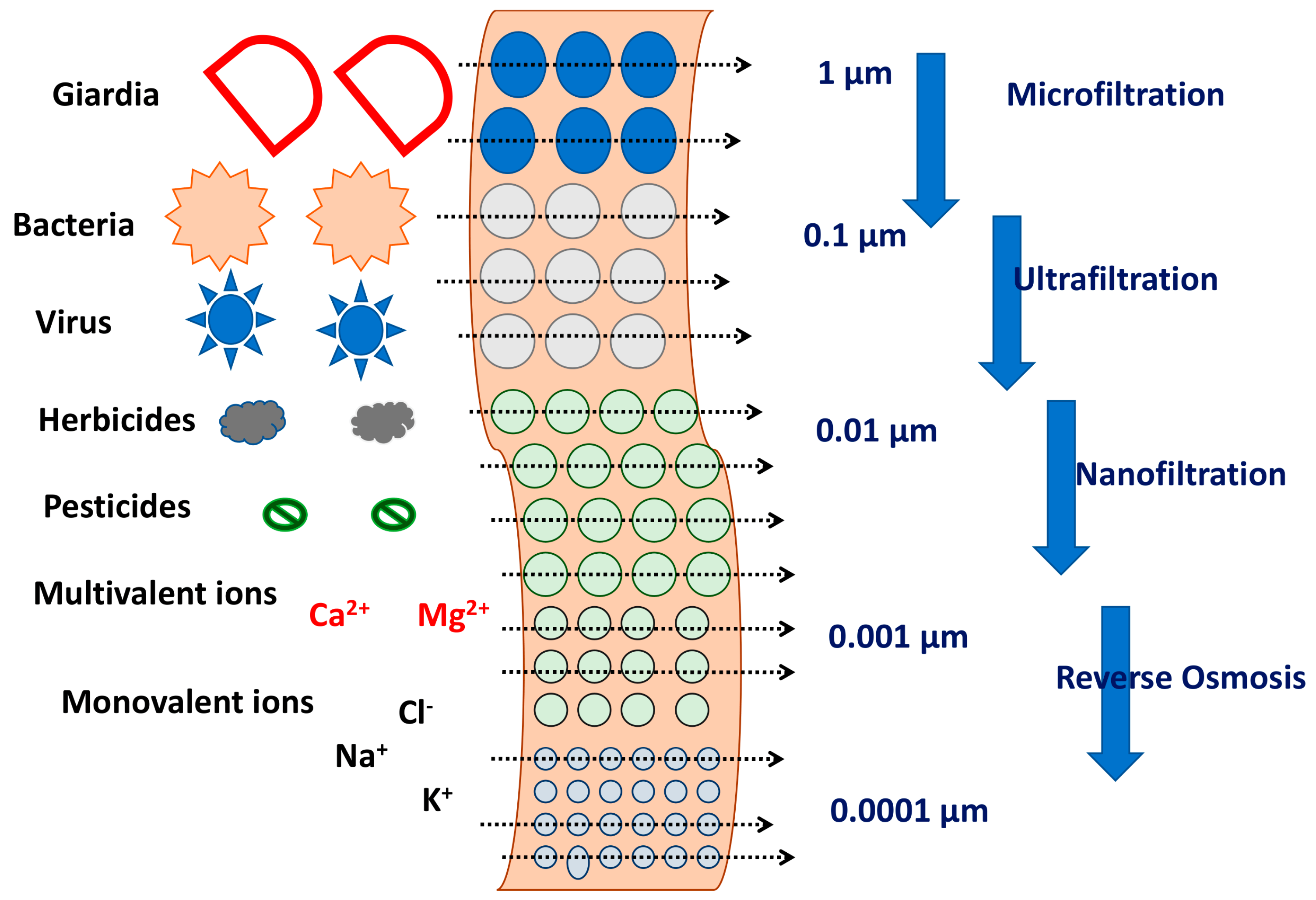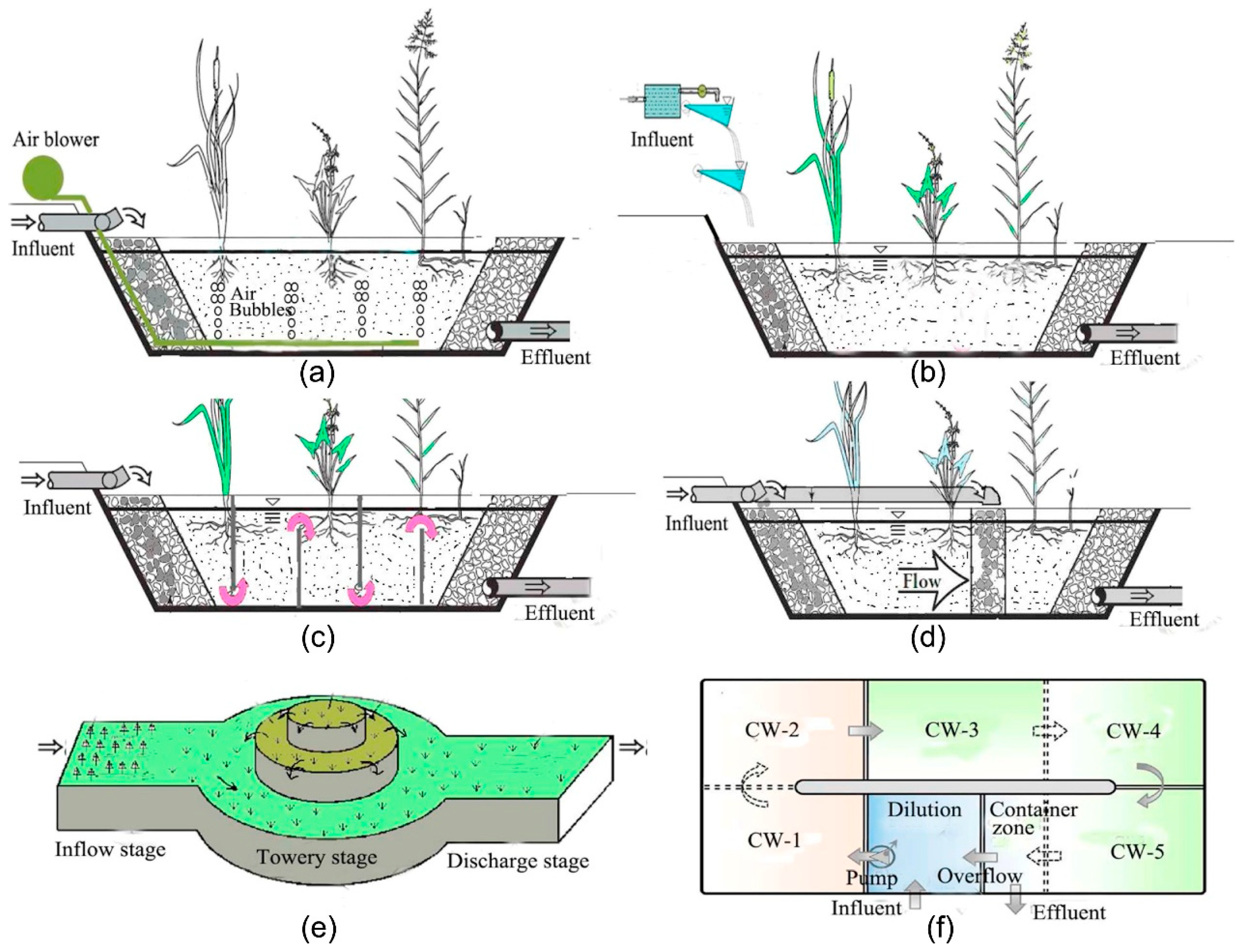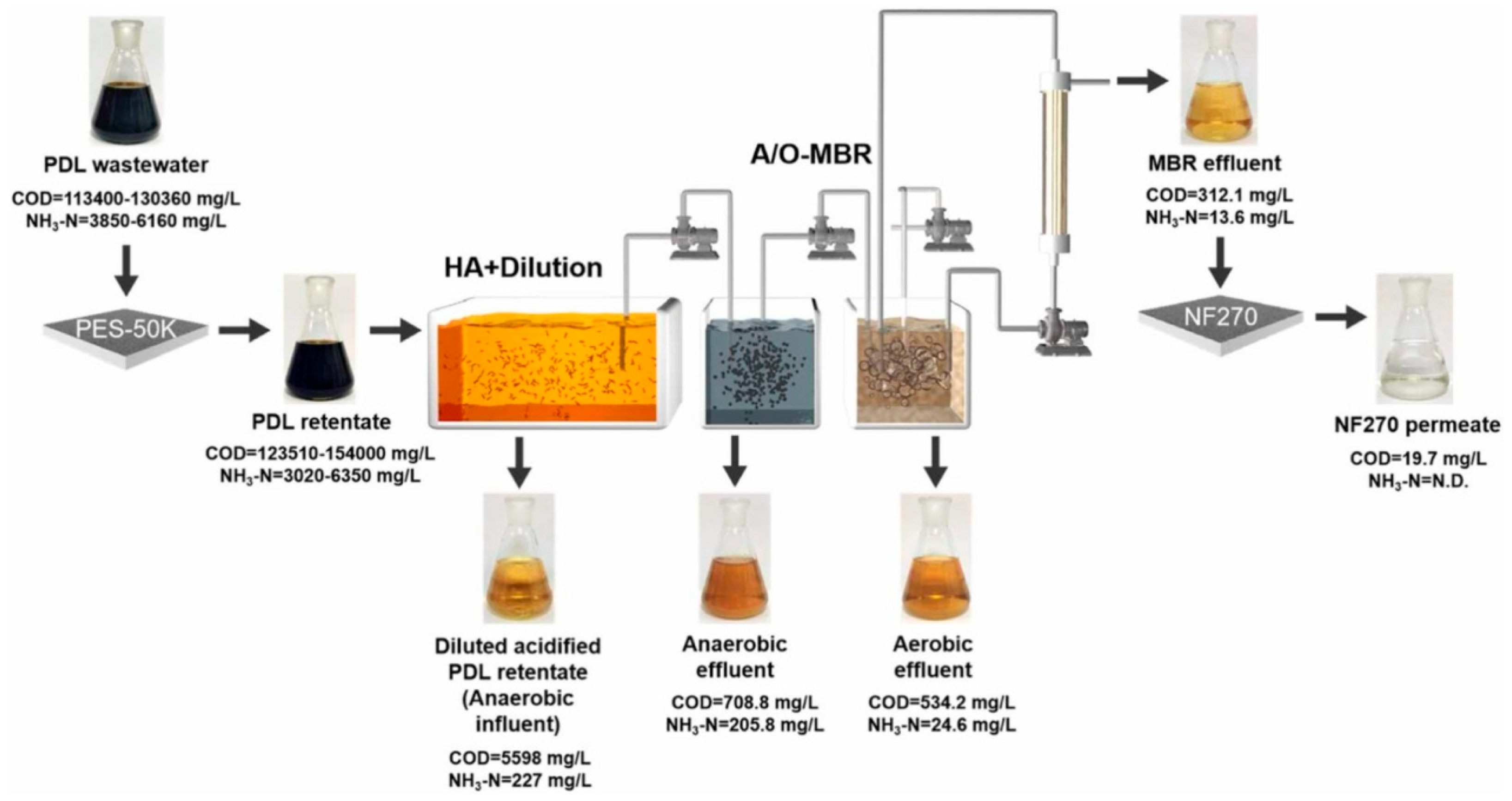Abstract
The management of domestic wastewater in rural areas has always been challenging due to characteristics such as the wide distribution and dispersion of rural households. There are numerous domestic sewage discharge methods used in rural areas, and it is difficult to treat the sewage. To address this problem, decentralized wastewater treatment systems (DWTSs) have been installed around the globe to reuse and recycle wastewater for non-potable uses such as firefighting, toilet flushing, and landscape irrigation. This study compares the currently implemented treatment processes by investigating them from the point of view of their performance and their advantages and disadvantages to provide new ideas for the development of rural wastewater treatment technologies. According to conventional treatment technologies including activated sludge (OD, A/O, A/A/O, SBR), biofilm (biofilter, MBBR, biological contact oxidation, biofluidized bed) and biogas digesters, natural biological treatment technologies including artificial wetlands (surface flow, vertical flow, horizontal submerged flow artificial wetlands), soil percolation systems (slow, fast, subsurface percolation and surface diffusion) and stabilization pond technology and combined treatment technologies are categorized and further described.
1. Introduction
Currently, 46% of the global population (3.6 billion people) lacks the restrooms needed to safely dispose of human waste [1], nearly 946 million people do not have adequate sanitation facilities and still defecate in the open [2,3], and nearly 80% of wastewater flows back into the environment without treatment or reuse [4]. At least 2 billion people use drinking water contaminated with fecal matter, increasing health risks for local populations [5,6]. Environmental pollution caused by rural domestic sewage is not only a hidden danger to the safety of rural water sources, but also aggravates the crisis of freshwater resources, makes farmland irrigation ineffective, and endangers the survival and development of farmers [7]. As shown in Figure 1, taking the rural distribution of Vietnam as an example [8], the rural sewage is relatively dispersed, with a low concentration and great changes; most of it does not contain heavy metals and toxic and harmful substances, but contains a certain amount of nitrogen and phosphorus, and the water quality fluctuates greatly and the biodegradability is strong. However, the urban population is dense, the amount of domestic sewage is large, and the impact load during treatment is large. Centralized treatment methods, such as biological treatment, chemical treatment and physical treatment, etc., are more suitable [9]. These treatment methods usually require large treatment plants and treatment equipment. The difference between centralized and decentralized wastewater treatment systems is complex. However, the main characteristics of centralized sewage treatment systems include large-scale systems, a remote water supply and top-down governance models. In contrast, decentralized wastewater treatment systems are smaller and use local water sources. Multiple levels of governance are often involved, and infrastructure can be privately owned and operated. Therefore, it is important to study rural domestic sewage treatment technology. According to statistics, the annual amount of sewage produced in China’s rural areas exceeds 900,000 m3, most of which is decentralized. Therefore, it is difficult to collect decentralized rural sewages due to the need for many water pipelines and long-distance transportation, which has a high cost. In addition, the infrastructure of rural domestic sewage treatment is weak, so the treatment of rural domestic sewage is difficult, resulting in the substandard discharge of rural sewage in many areas, the serious pollution of the rural water environment and local environment, and aggravating the pollution of the rural ecological environment [10]. To address this, DWTS systems are gaining popularity in society as a government initiative to reduce the problem of inadequate sanitation and to provide an optimal water supply for non-drinking purposes [11]. Over the past 100 years, several countries have attempted to improve and produce high-quality reuse methods for non-potable water and irrigation purposes [12].
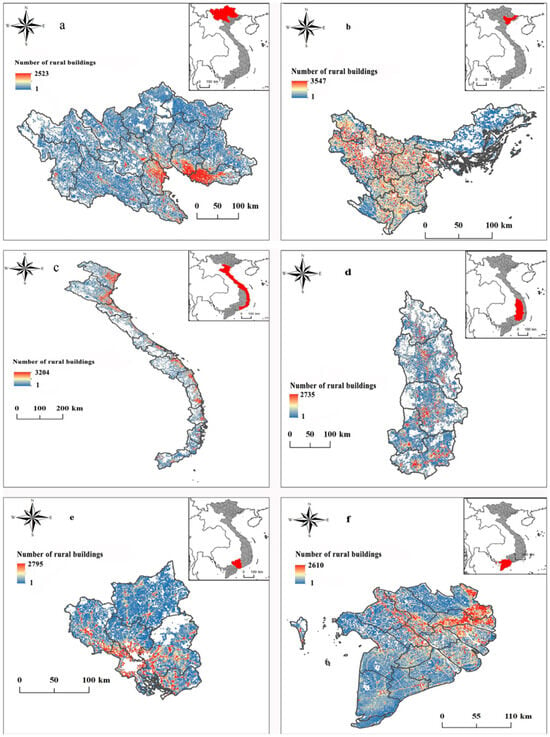
Figure 1.
(a–f) Map of the distribution of rural buildings in six Vietnamese regions. Reproduced with permission from [8]. Copyright 2023, MDPI.
Many countries around the world still have a considerable number of residents living in rural areas (Figure 2), leading to water shortages in these areas. To solve this issue, the treatment of rural domestic wastewater is needed [13]. Different types of decentralized sewage treatment systems are usually developed to solve part of the rural sewage discharge problem by utilizing the advantages of each DWTS system. However, in some cases, with increasing environmental degradation and strict restrictions on sewage discharge or reuse, an independent technology cannot meet the requirements of the new guidelines. As a result, the development of new integrated treatment methods is gradually increasing by combining different DWTS configurations with other treatment technologies to improve the efficiency of removing organic matter and nutrients, eliminate emerging pollutants, and promote energy recovery opportunities. This paper also describes the research and application of different distributed treatment technologies in rural domestic sewage, the evaluation of overall eutrophication, and the challenges and factors affecting their performance.

Figure 2.
Statistical data of the rural population in representative countries (a), per capita water consumption of China in 2022 (b), and percentage of people suffering from water shortages all over the world (c). Reproduced with permission from [13]. Copyright 2024, Elsevier.
2. Global Status of Decentralized Rural Domestic Wastewater Treatment
2.1. Status of Decentralized Wastewater Treatment in Central and Eastern Europe
In Central and Eastern Europe, about a third of the population lives in small settlements. Since the implementation of the current European Municipal Sewage Treatment Directive, the quality of fresh water sources in Europe has improved significantly. In the last decade, the connection of small settlements to sewage treatment plants has increased from 9% to 19% [14]. Decentralized wastewater treatment systems are considered as the most suitable solution due to their low operational and maintenance requirements and costs [15]. In public wastewater treatment plants in countries such as the Czech Republic, Latvia and Ukraine, batch reactors and other types of activated sludge systems dominate the treatment technology. Although there are many different technologies available to treat wastewater, septic tanks are still the most common solution [16]. It is important to note that septic tanks are a significant source of greenhouse gas (GHG). In Slovakia, for example, wastewater treatment plants produce 90% of greenhouse gases. The most common treatment system based on nature is constructed wetland treatment technology, which is used in most countries [17]. In addition, waste stabilization ponds have been used in countries such as Bulgaria, Romania and Slovenia.
2.2. Status of Decentralized Wastewater Treatment in Africa
The situation of water supply and sanitation in African countries is not optimistic, especially in sub-Saharan Africa [18,19]. Water technology and sanitation are still not a priority in many African countries. The wastewater conditions in many countries in Africa are comparable to those in medieval Europe and some countries in the Americas, where populations often suffer from many water-borne diseases [20]. Wastewater usually contains high concentrations of organic and inorganic nutrients, heavy metals, and pathogens. They can be toxic and harmful to humans, crops, aquatic plants, and fish [21]. In some countries, such as South Africa and Nigeria, partially decentralized wastewater treatment plants have been established to collect and treat sewage. Septic tanks are the main treatment technology, and purification tank technology is also being effectively promoted and used [22]. However, due to the continuous growth of the population, the excessive increase in wastewater production has a major impact on water resources, the environment and human health. Therefore, low-cost technologies such as natural biological treatment technology can only be sought to achieve efficient wastewater treatment, aiming to promote human health and environmental protection [23,24]. And this requires a real awareness of the challenges related to wastewater and sanitation, an awareness of the impact of local populations, good governance, the rational use of sewage and sanitation-oriented resources, and especially political will and commitment.
3. Conventional Treatment Technologies
3.1. Activated Sludge Process
3.1.1. Oxidation Ditch
Oxidation ditch (OD), also known as the cyclic aeration method, is a method based on the deformation of activated sludge. This method uses a kind of end-to-end circulation flow aeration ditch into which sewage seeps to be purified. Oxidation ditch technology was developed in the Netherlands in the 1950s and has been used worldwide for many years. The closed aeration of a continuous circulating reaction tank is used to degrade and remove organic matter in sewage through microorganisms and bacteria in activated sludge [25,26]. Compared with the traditional activated sludge process, this process has the advantages of a high purification degree, stable and reliable operation, and a reduction in the energy used [27]. At present, the common oxidation ditch types are the Carrousel oxidation ditch, the Orbal oxidation ditch, alternating working oxidation ditch, DE oxidation ditch and integrated oxidation ditch. Generally speaking, the hydraulic retention time of oxidation ditches is longer, and a secondary sedimentation tank is needed, which covers a large area. However, for small-scale oxidation ditches, the problem of land occupation is not obvious. The development of integrated oxidation ditches and other technologies has also simplified the process to a certain extent and reduced its footprint. In terms of unit power consumption, oxidation ditch sewage treatment plants use a combination of blast aeration and water propeller equipment, which has an obvious energy-saving effect. At the same time, the development of integrated oxidation ditches also means that the oxidation ditch sludge can automatically return, further reducing energy consumption. In terms of water quality indexes, the inefficiency of removing ammonia nitrogen and phosphorus is a common problem. Yang et al. [28] verified that the mixing process in oxidation ditches tends to circulate flow and the dispersion mode of continuous stirred tank reactors by constructing a dynamic mixing model of the oxidation ditch and the aeration tank, which increases the reaction time of the wastewater in the reactor. Park et al. [26] further found that longer solid and hydraulic retention times in oxidation ditches were more effective in achieving novel nitrification by microorganisms and bacteria in the reactor. Alramthi et al. [25] analyzed the influent, effluent and operational data of treatment plants using oxidation ditches in Arab countries for a period of seven years (2014–2020) and showed that wastewater treatment plants with oxidation ditches in Arab countries have good operational performance.
As early as the 1920s, the United States began to use oxidation ponds to treat sewage [29]. According to the dominant strains of bacteria and the corresponding biochemical reaction, they can be divided into four types: anaerobic pools, aerobic pools, parthenogenetic pools and aeration pools [30]; these were then upgraded and new high-efficiency algal pools, aquatic plant pools, flow aeration pools, combined-process pools, and other new types of oxidation pools were built. In China, oxidation ditch technology has also been widely used and promoted [31], and it has been found that, while maintaining an ultra-low sludge load and high dissolved oxygen concentration, in cold areas oxidation ditches can still achieve a good pollutant removal efficiency [32]. To date, more than 850 oxidation ditch systems are in operation in the world [33].
Nitrogen removal in an oxidation ditch is achieved by point aeration through simultaneous nitrification and denitrification in alternating anoxic zones at several points in the oxidation ditch. Therefore, the placement of surface aeration equipment and the control of dissolved oxygen (DO) are critical to improving nitrogen removal in the oxidation ditch process. However, it is very difficult to accurately control the DO concentrations and anoxic-oxygen partitioning ratios under point aeration. As a result, the nitrogen removal efficiencies have been found to be less than optimal for some oxidation ditch processes.
To solve the point aeration problem in oxidation ditches and enhance nitrogen removal, Jin et al. [34,35,36] proposed a new step aeration method, as shown in Figure 3, to determine the optimal anoxic–oxygen partitioning ratio for step aeration oxidation ditches. The operation and characteristics of various oxidation ditch processes are shown below.
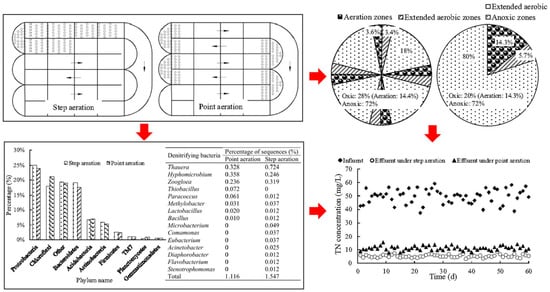
Figure 3.
Step aeration and point aeration were used to analyze the nitrogen removal performance and mechanism of a Carrousel oxidation ditch with microporous step aeration, and point aeration was used to analyze the nitrogen removal performance and mechanism of the Carrousel oxidation ditch with microporous aeration. Reproduced with permission from [35]. Copyright 2015, Elsevier.
3.1.2. A/O, A/A/O and A/O/A
The anoxic–aerobic process (A/O) realizes the removal of nitrogen from wastewater by controlling different oxygen conditions and microbial populations, and is widely used because of its efficient operation technique and high removal performance. This process realizes the removal of nitrogen from wastewater by controlling different oxygen conditions and using different microbial populations in a bioreactor [37]. A/O is popular because of its effective organic removal coupled with its simple operation and low cost. However, nitrogen oxides may be generated during wastewater treatment and lead to the greenhouse effect and atmospheric pollution, respectively, with limited studies on their emission characteristics and transformation mechanisms. Han et al. [38] applied intelligent oxygen regulation to the A/O wastewater treatment process, which is also known as the internal circulation anaerobic aerobic process (I-A/O), and compared it with the conventional A/O process (C-A/O). They also explored the regulatory effect of intelligent oxygen regulation on the conversion of NOx (i.e., nitric oxide (NO) and nitrogen dioxide (NO2)) and N2O. In this process, the removal of N2O was mainly achieved by the action of microorganisms, using different microbial activities under anaerobic and aerobic conditions. Figure 4 shows the emission characteristics of N2O and NOx in A/O wastewater treatment under different oxygen regulation strategies. The optimum removal rate of N2O achieved was 60% in I-A/O, and C-A/O exhibited the most significant removal of NOx.
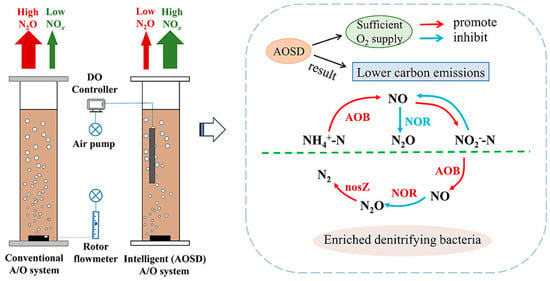
Figure 4.
Nitrogen and nitrous oxides emission characteristics of the anoxic/oxic wastewater treatment process under different oxygen regulation strategies. Reproduced with permission from [38]. Copyright 2024, Elsevier.
The anaerobic–anoxic–oxic process (A/A/O) is an extension of the A/O process, where an anaerobic tank is added in front of an anoxic tank to hydrolyze, acidify and methanize the organic matter and remove the organic matter from the wastewater; therefore, the nitrogen removal and phosphorus removal of the A/A/O process is better than that of the A/O process. In the conventional A/A/O process, low-cost and high-quality nutrient removal cannot be effectively realized. Therefore, people have constantly tried to innovate during the development of the A/A/O process. The A/A/O process and modified oxygen settling anaerobic reactor system (A/A/O-MOSA) have achieved remarkable results in water quality removal as well as sludge reduction [35]. Wang et al. [39] further found that the modified A/A/O activated sludge–biofilm coupled process can operate stably at low temperatures with excellent treatment performance. In the context of global climate change, Yu et al. [40] found that an anaerobic anoxic membrane bioreactor (A/A/O-MBR) showed high process stability under hydrodynamic shock, which is more conducive to the efficient and stable operation of wastewater treatment plants in heavy rainfall and typhoon-prone areas.
The anaerobic/oxygenated/anoxic (A/O/A) process solves the problem of the traditional A/A/O process that relies on a highly nitrified wastewater cycle to remove energy-intensive nutrients. In recent years, wastewater treatment has shown a trend toward low-carbon sources. However, there are limited studies on simultaneous denitrification and phosphorus removal through process improvement; however, to improve the utilization efficiency of denitrifying carbon sources, Gong et al. [41] proposed a pilot-scale bioreactor system with the synergistic action of denitrifying phosphorus removal (DPR) and endogenous denitrification (ED) for high-level nutrient removal, which was operated in the anoxic phase without extracellular carbon sources in an anaerobic/anoxic (A/O/A) alternating mode operation. The flow diagrams of A/O/A and A/A/O are shown in Figure 5. The results showed that the A/O/A system was significantly more effective in removing nitrogen and phosphorus compared to the A/A/O system. Recent studies have found that the anaerobic/aerobic/anoxic simultaneous nitrification, denitrification, and phosphorus removal process (AOA-SNDPR) is a promising technology for enhanced biological wastewater treatment and in situ sludge reduction [42]. The novel anaerobic/aerobic/anoxic–aerobic granular sludge (AOA-AGS) process also has the advantage of effective carbon utilization and low-carbon treatment [43]. These works provide new insights for the further expansion and optimization of A/O/A systems.
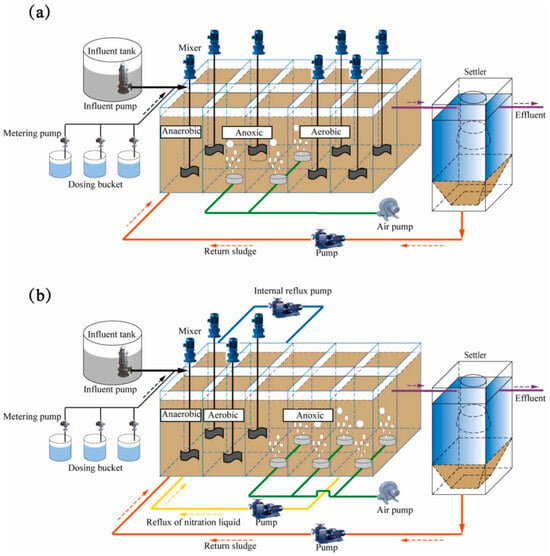
Figure 5.
The schematic diagram of the (a) A/O/A and (b) A/A/O processes. Reproduced with permission from [41]. Copyright 2023, Elsevier.
3.1.3. SBR
The sequencing batch reactor activated sludge process (SBR) is also known as the batch activated sludge method. In recent years, with the development of instruments and automatic control technology and equipment, new SBR processes such as ICEAS, CASS, CAST, DAT-IAT, UNITANK, MSBR and so on have continued to emerge. SBR is a new kind of aerobic biological treatment technology. It uses a variable batch reactor to provide time-dependent wastewater treatment rather than continuous flow-provided spatial wastewater treatment. The SBR method carries out five operation processes, namely inlet, reaction (aeration), precipitation, effluent and standby (idle), in time order. The main equipment used is the orderly batch reactor, without a secondary sedimentation tank and sludge reflux system, and the initial sedimentation tank can also be omitted. The whole process is simple, covers a small area, and has a low cost. It is reasonable and simple, requires fewer resources, and has a good nitrogen and phosphorus removal effect. However, due to the complexity of the automatic control system, the maintenance and management costs of the equipment have increased [44].
The development of the SBR process took for more than 100 years and can be roughly divided into three periods. As early as 1914, the British scholars Ardern and Locket invented the water treatment process. In the 1970s, Professor R. Irvine developed the laboratory-scale SBR process for systematic and in-depth research at the University of Notre Dame in the United States, and in 1980, the U.S. Environmental Protection Agency (EPA), under the auspices of Culver City, Indiana, modified and put into production the world’s first SBR process water treatment plant. However, due to its cumbersome operation, and the lack of automatic control equipment and technology, it was quickly replaced. After the 1980s, with the automatic monitoring and control of hardware equipment and electronic computers, the development of the SBR method gained new vitality. At present, because the process is simple, has a high processing efficiency, has flexible operation and does not lead to sludge expansion, it has become the first choice for small and medium-sized sewage treatment plants, and is widely used around the world. In China, 30–40% of sewage treatment plants with a daily treatment capacity of less than 50,000 tons use the SBR method. Recent studies have found that the simultaneous nitrification and denitrification sequence batch reactor (SND-SBR) has superior performance [45], and a wastewater treatment plant using the SND-SBR process was recently established in Saudi Quba, eastern Saudi Arabia [46].
A comparison of various activated sludge technologies for treating rural sewage is shown in Table 1.

Table 1.
Comparison of activated sludge technologies for treating rural sewage.
3.2. Biofilm Method
3.2.1. MBR
Membrane bioreactors (MBRs) combine membrane processes such as microfiltration or ultrafiltration with biological wastewater treatment processes such as activated sludge [47], and even though MBR produces better quality effluent and a smaller footprint, the operation and maintenance costs have increased. However, membrane fouling remains a key challenge due to reduced flux. In addition, high energy costs and aeration rate requirements make designing a cost-effective MBR plant a difficult engineering challenge. Figure 6 shows a membrane bioreactor system. Currently, emerging contaminants (ECs) can also be removed by adsorption on the membrane surface, biotransformation, membrane size exclusion, or volatilization [48], and Figure 7 shows EC screening through membranes with different pore sizes. New advances have also been made with regard to biofouling in the MBR process to reduce membrane flux and phosphorus removal, with lanthanum (La)-doped group quenching (QQ) beads being introduced into MBRs to design a more stable MBR process that can modulate biofouling and enhance phosphate removal [47,49]. Banti et al. [50] found that the Moving Bed Biofilm Reactor (MBBR-MBR) constitutes a highly efficient wastewater treatment technology with reduced transmembrane pressure and reduced fouling.
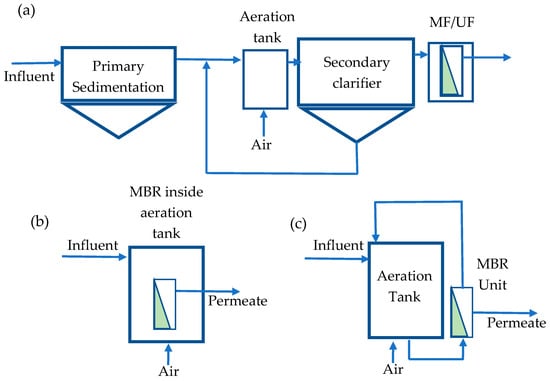
Figure 6.
Conventional activated sludge process + tertiary filtration (a), immersed MBR (b), and side-stream MBR (c). Reproduced with permission from [47]. Copyright 2022, MDPI.
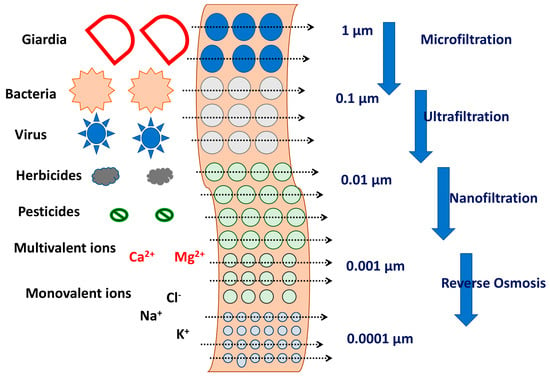
Figure 7.
Sieving of ECs through membranes with different pore sizes. Reproduced with permission from [51]. Copyright 2022, MDPI.
3.2.2. Biofilter
Biofilters are an artificially enhanced biological treatment technology developed based on the practice of wastewater irrigation, and can be divided into aerated biofilters (BAFs), denitrification filters (DNBFs) and so on.
BAFs are a new biofilm-based wastewater treatment technology developed in Europe and the United States in the late 1980s [52], characterized by the integration of biological contact oxidation and filtration, eliminating the need for a secondary sedimentation tank and making the process simpler [53,54]. Current studies have found that BAF can effectively remove high concentrations of antibiotics in aquaculture wastewater on the premise of effectively removing conventional pollutants. The main mechanisms are biodegradation and adsorption [46], and the average removal rates of chemical oxygen demand (COD), ammonia nitrogen (NH3-N) and total phosphorus (TP) reach 47.2%, 49.2% and 35.6%, respectively. Compared with traditional technology, it is significantly improved [55]. Considering the challenges of removing nitrogen from mature waste leachate, a novel combined continuous flow process incorporating denitrification and partial nitrification–anaerobic ammonia oxidation (PN/A) was developed using an internal circulation (IC) system and a biological aeration filter (BAF) biofilm reactor (IBBR), which provides a new perspective for solving the mature waste leachate problem [55].
DNBF is the most common biological nitrogen removal technology, and can effectively remove nitric acid from wastewater with sufficient organic carbon [56]. DNBF is more advantageous in terms of its operation management and consumption of resources. However, the secondary effluent from WWTPs is often in a high-nitrogen and low-carbon state due to the extreme depletion of organic carbon by the pre-biological treatment process. To meet the requirements of denitrifying microorganisms, it is necessary to improve the traditional DNBF technology. Tang et al. [56] proposed a novel heterotrophic hydrogen autotrophic denitrification system that uses a denitrifying biofilter coupled with water electrolysis (DNBF-WE), enhancing denitrification in the case of limited organic carbon in secondary effluent water. Wang et al. [57] developed filter materials using a heterotrophic and biomass–iron mixture (BIM) driven novel denitrifying biofilter (BIM-DNBF).
3.2.3. MBBR
Moving bed biofilm reactors (MBBRs) increase the biomass and biological species in the reactor by adding a certain number of suspended carriers to the reactor, thus improving the treatment efficiency of the reactor. The MBBR process has the high efficiency and operational flexibility of the activated sludge method, but also has the characteristics of the traditional biofilm method in terms of the shock load resistance, long sludge age, and low residual sludge [58,59,60]. Since the late 1980s, MBBR has been put into operation in more than 400 wastewater treatment plants in 17 countries around the world, with good results [61]. In brewery wastewater treatment, it was found that chemical oxygen demand (COD) removal was higher when using a MBBR with the addition of nitrate as a nitrogen source [62]. The wastewater treatment plant in Munich, Germany, has improved the traditional activated sludge process by improving the treatment effect and enhancing the nitrogen and phosphorus removal to obtain the INPOR MBBR series process [63,64].
3.2.4. Biological Contact Oxidation
The biological contact oxidation method is a biological treatment method between the activated sludge method and biofilm method. It is an efficient water treatment process used to purify organic wastewater with biofilm attached to the carrier. It has the characteristics of high efficiency and reduced energy consumption, a small footprint, shock load resistance, convenient operation and management, etc. However, if the design is not correct, blockages are easily produced. China has constructed a demonstration project showing in situ remediation by biological contact oxidation in heavily polluted rivers on the north bank of Dianchi Lake. This study found that the establishment of a zoned wastewater treatment zone (WTZ) and a bioaugmentation zone (BAZ) in a multistage biological contact oxidation reactor (MBCOR) using modified polyamide fibers as the bio-carrier can metabolize the textile dye wastewater removal while minimizing the sludge production and decreasing the environmental pollution [65]. Meanwhile, the microbial community in the biological contact oxidation reactor plays a vital role in improving the performance of biotechnology in removing antibiotics from wastewater [66].
3.2.5. Biofluidized Bed Method
The fluidized bed reactor (FBR) works on the principle that wastewater flows through carriers such as zeolite, activated carbon, and porous polymers by adsorption and desorption to remove organic pollutants to achieve wastewater purification [67,68]. The first FBR wastewater treatment plant was successfully put into operation in the United States in the early 1980s [69,70,71]. Current studies have shown corresponding progress in the development of a magnetically stabilized fluidized bed reactor (MSFBR) [72].
3.2.6. Digester
Biogas digesters are a biological technology where, under anaerobic conditions, parthenogenetic anaerobic and anaerobic microbial communities degrade organic pollutants into biogas through hydrolysis, acid production, acetone production and methanogenesis mechanisms; they are the most commonly used and least costly of the rural wastewater treatment technologies, and also protect the ecological environment in the treatment of domestic wastewater [73]. However, the practical application of anaerobic technology is preceded by problems related to nitrogen accumulation and the emission of greenhouse gases [74]. In recent years, more and more efficient anaerobic treatment equipment and technologies have been developed, such as the upflow sludge bed reactor (UASB), anaerobic filtration (AF), and the anaerobic expanded granular sludge bed (EGSB). The problem of the inefficiency of biogas digesters in low-temperature conditions has been solved in the Kyrgyz Republic. China is the country with the greatest interest in biogas development in the world; initially, rural user biogas digesters were mainly used to solve the problem of an insufficient supply of straw incineration. Large and medium-sized biogas projects began later in 1936, and since then, the establishment of large and medium-sized wastewater projects, aquaculture effluents, village and township biomass waste products, and urban waste biogas has broadened the scope of biogas production and use [75].
A comparison of various rural sewage biofilm treatment technologies is shown in Table 2.

Table 2.
Comparison of biofilm treatment technology for rural sewage.
4. Natural Biological Treatment Technology
4.1. CWs
Constructed wetlands (CWs) technology was first applied by K. Seidel in the 1960s [76]. In the early stage of the development of CWs, they were mainly used to treat conventional tertiary and secondary domestic wastewater [77]. Over the years, the design and process methods of constructed wetlands have been greatly improved. The working principle of CWs involves the precipitation, filtration, precipitation, volatilization, adsorption, and plant absorption of various microorganisms distributed on the soil and plant surface [78]. CWs can be divided into surface flow, vertical flow and horizontal subsurface flow constructed wetlands [79,80]. Plants can supply oxygen to heterotrophic microorganisms in their root circumference, thereby creating an oxygen-rich microenvironment in a reducing substrate. Microorganisms grow on the roots of aquatic plants and establish a symbiotic cooperative relationship with taller plants, increasing the rate of degradation of pollutants in wastewater. This kind of cooperation is not only carried out in the root zone, but also in areas far from the root zone in a facultative and anaerobic environment, which is conducive to facultative and anaerobic purification. In addition, the growth of aquatic plant roots is conducive to improving the hydraulic conductivity of the bed matrix layer, further promoting the removal of pollutants and the growth of microorganisms. CWs have the advantages of being robust, having a high external energy demand, being easy to operate and maintain, having a low operation cost, and having a strong purification effect [81]. CWs have been widely used worldwide; for example, India effectively removed nutrients from agricultural runoff and maintained the ecological safety of a river basin by constructing CW complexes [82]. Constructing a CW between the Emscher River and the Rhine–Herne Canal in Germany not only mitigated river pollution, but also dealt with issues such as the recycling of toilet wastewater [83]. The Watarase impoundment in Tochigi, Japan, performs the purification process and ensures good water quality in the impoundment [84]. However, CWs require a large amount of land, the growth of various plants is affected by the seasons, and the plant species need to be matched appropriately. Wu et al. [85] investigated the progress made by different operational curatives, innovative designs and configurations, and Figure 8 shows these enhanced CWs. Meanwhile, the use of recirculation to improve the performance of CWs depends on a number of factors, including the type of CW and the influent load, and Table 3 presents the use of recirculated water in submerged septic tanks for the treatment of various wastewater applications.
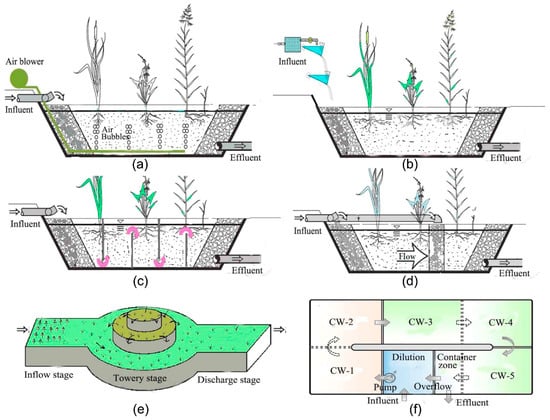
Figure 8.
Intensified constructed wetlands: (a) an artificial aerated CW modified with graphical components; (b) drop aerated CW modified with graphical components; (c) baffled-flow CW modified with graphical components; (d) step feeding CW modified with graphical components; (e) hybrid-towery-modified CW; (f) circular-flow-corridor-modified CW. Reproduced with permission from [85]. Copyright 2014, Elsevier.

Table 3.
The application of recirculation in subsurface flow CWs treating various wastewaters. Reproduced with permission from [85]. Copyright 2014, Elsevier.
4.2. Soil Percolation Treatment Systems
Soil leachate treatment technologies have received increasing attention due to their low operating costs, low energy consumption and absence of secondary pollutants [86,87]. Their types are flexible and diverse, including fast and slow infiltration systems and surface and subsurface flow systems [88]. They were first applied in Japan in the 1970s. However, effective nitrogen removal remains a challenge. To mitigate greenhouse gas emissions, the application of zero-valent iron (ZVI) and the incorporation of porous mineral materials (PMM) in subsurface wastewater infiltration systems (SWIS) can simultaneously improve the nitrogen removal efficiency, and the emission of nitrous oxide has been well controlled [89]. Recent studies have shown that increasing carbon loading can improve the nitrate removal achieved by denitrification in SWIS [90].
4.3. Stabilization Tank
As a natural water treatment system, stabilization ponds achieve the purpose of wastewater treatment through the action of algae and aquatic organisms [91]. According to the microorganisms and organic carbon content in the stabilization ponds, they can be divided into anaerobic ponds, aerobic ponds, parthenogenetic ponds and other types; they also have a low cost, do not need to deal with sludge, and their maintenance and management is convenient [92]. In 1901, the first stabilization pond was constructed in Texas, in the United States of America. At present, the world has more than 50 countries that use stabilization pond systems, with this water system being applied more in developed parts of the region [93]. There are more than 1500 stabilization ponds in France, more than 2000 in Germany, and more than 20,000 ponds in the United States [94]. In developing countries, the application of stabilization ponds is also more extensive [95]; for example, 40% of the total industrial wastewater in Malaysia is treated using stabilization ponds. China has built 118 stabilization ponds, with a daily sewage treatment capacity of 1.9 million tons [96].
A comparison of various natural biological treatment technologies of rural sewage is shown in Table 4.

Table 4.
Comparison of natural biological treatment techniques of rural sewage.
5. Co-Processing Technology
Since traditional technologies cannot eliminate difficult and non-biodegradable substances, joint treatment technologies that combine traditional technologies with advanced oxidation processes have emerged [97,98]. As an example, the A/O process can produce good treatment results when combined with other treatment technologies. Chen et al. [99] found that the multistage A/O process in CWs is a promising technology for the treatment of carbon-constrained wastewaters. The A/O-MBBR method requires lower dissolved oxygen, exhibits a higher tolerance to harsh conditions, and exhibits better resistance to shock loading and denitrification rates than A/O bioreactors [100]. The combination of hydrolytic acidification (HA) pretreatment, an anaerobic aerobic membrane bioreactor (A/O-MBR) and nanofiltration (NF) can significantly improve the efficiency of COD treatment [101]; the integrated A/O-MBR-NF process flow diagram is shown in Figure 9. The SBR-A/O process improves the efficiency of wastewater treatment and is now widely used in treating swine wastewater [102,103].
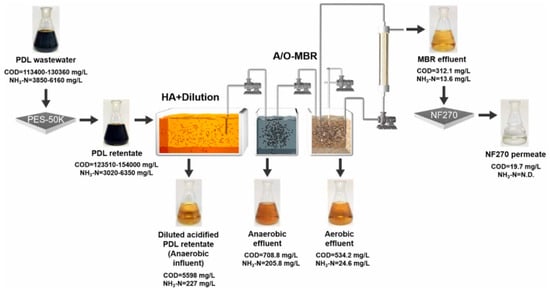
Figure 9.
Integrated A/O-MBR–NF process for treating high-COD-content wastewater from traditional Chinese medicine. Reproduced with permission from [101]. Copyright 2024, Elsevier.
6. Conclusions and Outlook
This paper reviews global rural distributed water and wastewater technologies and systems. At present, conventional treatment technology, natural biological treatment technology and combined treatment technology are mainly used, among which conventional treatment technology includes the activated sludge method (oxidation ditch, A/O, A/A/O, SBR), the biological membrane method (MBR, biological filter, MBBR, the biological contact oxidation method and the biological fluidized bed method) and biogas ponds. Natural biological treatment technologies include constructed wetlands (surface flow, vertical flow, horizontal subsurface flow constructed wetlands), soil percolation systems (slow, fast, subsurface percolation and surface overflow) and stabilization pond technologies. Technical personnel are required to fully grasp the characteristics of rural domestic sewage treatment and the implementation of decentralized treatment, combined with the current economic and technical conditions for implementation. Decentralized wastewater treatment technology has broad development prospects. For developed countries, such as the United States, the main difficulty in the development of distributed water treatment technology is the growth of water reuse demand. According to different environment and processing needs, CWs, MBR, A/O and other technologies can be adopted. However, in developing countries, due to the general lack of a sound pipe network supporting facilities in rural areas and a high population density in urban areas, the cost of laying new pipe networks and repairing existing pipe networks is becoming higher and higher, so distributed water treatment technology is more favored. The cost of natural treatment technology such as land treatment technology and constructed wetland systems is economical, and the operation technology is simple and suitable for less developed areas. In the face of future challenges and opportunities, the wastewater treatment industry needs to constantly innovate and upgrade to meet market demand and environmental protection requirements. The efficiency and quality of wastewater treatment could be improved by developing more efficient, low-consumption and environmentally friendly treatment technologies. At the same time, relevant departments, enterprises and all sectors of society need to work together to create a good environment for the healthy development of the wastewater treatment industry.
Author Contributions
Conceptualization, X.L.; methodology, X.L.; software, X.L.; validation, Z.W.; formal analysis, X.L.; investigation, X.L.; resources, X.L.; data curation, X.L.; writing—original draft preparation, X.L.; writing—review and editing, X.Z. (Xu Zhang), M.Z. and C.F.; visualization, Z.W.; supervision, X.Z. (Xu Zhang) and C.F.; project administration, X.L.; funding acquisition, X.Z. (Xiangyong Zheng) and C.F. All authors have read and agreed to the published version of the manuscript.
Funding
This research was funded by the Wenzhou Ecological Park Research Project (grant number SY2022ZD-1002-07) and the Wenzhou Science and Technology Project for Basic Society Development (grant number S20220015).
Data Availability Statement
The data presented in this study are available upon request from the corresponding author. The data are not publicly available due to funder restrictions.
Acknowledgments
The authors express their sincere gratitude for the work of the editor and the anonymous reviewers.
Conflicts of Interest
The authors declare no conflicts of interest.
References
- Appiah-Effah, E.; Boakye, K.; Salihu, T.; Duku, G.A.; Fenteng, J.O.D.; Boateng, G.; Appiah, F.; Nyarko, K.B. Determinants of open defecation among rural women in ghana: Analysis of demographic and health surveys. Environ. Health Insights 2024, 18, 11786302241226774. [Google Scholar] [CrossRef]
- Bain, R.; Johnston, R.; Mitis, F.; Chatterley, C.; Slaymaker, T. Establishing sustainable development goal baselines for household drinking water, sanitation and hygiene services. Water 2018, 10, 1711. [Google Scholar] [CrossRef]
- Yu, Q.; Liu, R.; Chen, J.; Chen, L. Electrical conductivity in rural domestic sewage: An Indication for comprehensive concentrations of influent pollutants and the effectiveness of treatment facilities. Int. Biodeterior. Biodegrad. 2019, 143, 104719. [Google Scholar] [CrossRef]
- Zhong, L.; Ding, J.; Wu, T.; Zhao, Y.; Pang, J.W.; Jiang, J.P.; Jiang, J.Q.; Li, Y.; Ren, N.Q.; Yang, S.S. Bibliometric overview of research progress, challenges, and prospects of rural domestic sewage: Treatment techniques, resource recovery, and ecological risk. J. Water Process Eng. 2023, 51, 103389. [Google Scholar] [CrossRef]
- Schellenberg, T.; Subramanian, V.; Ganeshan, G.; Tompkins, D.; Pradeep, R. Wastewater discharge standards in the evolving context of urban sustainability-the case of India. Front. Environ. Sci. 2020, 8, 30. [Google Scholar] [CrossRef]
- Berihun, G.; Abebe, M.; Hassen, S.; Gizeyatu, A.; Berhanu, L.; Teshome, D.; Walle, Z.; Desye, B.; Sewunet, B.; Keleb, A. Drinking Water contamination potential and associated factors among households with under-five children in rural areas of dessie zuria district, Northeast Ethiopia. Front. Public Health 2023, 11, 1199314. [Google Scholar] [CrossRef]
- Duan, N.; Xiong, J.; Feng, Q.; Wang, L.; Yang, F.; Ding, H. Special rural sewage treatment plant in Jiangxia district, Wuhan city, China. Sustainability 2023, 15, 1764. [Google Scholar] [CrossRef]
- Deng, X.; Liang, Y.; Li, X.; Xu, W. Recognition and spatial distribution of rural buildings in Vietnam. Land 2023, 12, 2142. [Google Scholar] [CrossRef]
- Li, Z.; Hu, K.; Zhang, X.; Gong, L.; Jiang, Z.; Xing, Y.; Ding, J.; Tian, J.; Huang, J. Distributed treatment of rural environmental wastewater by artificial ecological geographic information system. J. King Saud Univ. Sci. 2022, 34, 101806. [Google Scholar] [CrossRef]
- Wang, J.; Liu, P. Study on environmental pollution and governance in rural development. Fresenius Environ. Bull. 2019, 28, 9218–9222. [Google Scholar]
- Chen, P.; Zhao, W.; Chen, D.; Huang, Z.; Zhang, C.; Zheng, X. Research progress on integrated treatment technologies of rural domestic sewage: A review. Water 2022, 14, 2439. [Google Scholar] [CrossRef]
- Jiao, J.; Yang, Z.; Shi, B.; Dogot, T.; Azadi, H.; Xu, K.; Yin, C. How environmental regulation affects rural residents’ willingness to Pay for sustainable domestic sewage treatment: Mediating and interaction effects. Water 2024, 16, 761. [Google Scholar] [CrossRef]
- Zhang, X.; Ma, G.; Chen, T.; Yan, C.; Chen, Y.; Wang, Q.; Peng, X.; Xu, W.; Hao, T.; Zhang, T.; et al. Towards carbon-neutral biotechnologies for rural wastewater: A review of current treatment processes and future perspectives. J. Water Process Eng. 2024, 58, 104773. [Google Scholar] [CrossRef]
- Rosiek, K. Directions and challenges in the management of municipal sewage sludge in Poland in the context of the circular economy. Sustainability 2020, 12, 3686. [Google Scholar] [CrossRef]
- Eggimann, S.; Truffer, B.; Feldmann, U.; Maurer, M. Screening European market potentials for small modular wastewater treatment systems - an inroad to sustainability transitions in urban water management? Land Use Policy 2018, 78, 711–725. [Google Scholar] [CrossRef]
- Mac Mahon, J.; Knappe, J.; Gill, L.W. Sludge accumulation rates in septic tanks used as part of the on-site treatment of domestic wastewater in a northern maritime temperate climate. J. Environ. Manag. 2022, 304, 114199. [Google Scholar] [CrossRef]
- Boiocchi, R.; Mainardis, M.; Rada, E.C.; Ragazzi, M.; Salvati, S.C. Carbon Footprint and Energy recovery potential of primary wastewater treatment in decentralized areas: A critical review on septic and imhoff tanks. Energies 2023, 16, 7938. [Google Scholar] [CrossRef]
- Nguea, S.M. Uncovering the linkage between sustainable development goals for access to electricity and access to safely managed drinking water and sanitation services. Soc. Sci. Med. 2024, 345, 116687. [Google Scholar] [CrossRef]
- Nhamo, G.; Nhemachena, C.; Nhamo, S. Is 2030 too soon for africa to achieve the water and sanitation sustainable development goal? Sci. Total Environ. 2019, 669, 129–139. [Google Scholar] [CrossRef]
- Adeniran, A.; Daniell, K.A.; Pittock, J. Water infrastructure development in nigeria: Trend, size, and purpose. Water 2021, 13, 2416. [Google Scholar] [CrossRef]
- Godfrey, S.; Wambugu, M.; Parikh, P.; Tunhuma, F. Validation of the sustainable development goal 6 monitoring structures across east and southern africa using fuzzy logic analysis. Water 2022, 14, 3065. [Google Scholar] [CrossRef]
- Houemenou, H.; Tweed, S.; Dobigny, G.; Mama, D.; Alassane, A.; Silmer, R.; Babic, M.; Ruy, S.; Chaigneau, A.; Gauthier, P.; et al. Degradation of groundwater quality in expanding cities in West Africa. A case study of the unregulated shallow aquifer in Cotonou. J. Hydrol. 2020, 582, 124438. [Google Scholar] [CrossRef]
- de Miguel, A.; Froebrich, J.; Jaouani, A.; Souissi, Y.; Elmahdi, A.; Mateo-Sagasta, J.; Al-Hamdi, M.; Frascari, D. Innovative research approaches to cope with water security in Africa. Integr. Environ. Assess. Manag. 2020, 16, 853–855. [Google Scholar] [CrossRef]
- Mwandila, G.; Mwanza, M.; Sikhwivhilu, K.; Siame, J.; Mutanga, S.S.; Simposya, A. Modeling energy requirements for a biogas-supported decentralized water treatment systems for communities in chambishi (Zambia) and diepsloot (South Africa) townships. Renew. Energy Focus 2021, 37, 20–26. [Google Scholar] [CrossRef]
- Alramthi, S.M.; Ali, G.H.; Elthagafi, A.M.; Eldosari, S.H.; Zhu, B.-K.; Safaa, H.M. Oxidation ditches for recycling and reusing wastewater are critical for long-term sustainability-a case study. Sustainability 2022, 14, 16737. [Google Scholar] [CrossRef]
- Park, J.-G.; Lee, B.; Heo, T.-Y.; Cheon, A.-I.; Jun, H.-B. Metagenomics approach and canonical correspondence analysis of novel nitrifiers and ammonia-oxidizing archaea in full scale anaerobic-anoxic-oxic (A2/O) and oxidation ditch processes. Bioresour. Technol. 2021, 319, 124205. [Google Scholar] [CrossRef]
- Qiu, Y.; Ekström, S.; Valverde-Pérez, B.; Smets, B.F.; Climent, J.; Domingo Félez, C.; Cuenca, R.M.; Plósz, B.G. Numerical modelling of surface aeration and N2O emission in biological water resource recovery. Water Res. 2024, 255, 121398. [Google Scholar] [CrossRef]
- Yang, M. Dynamic Mixing Models and Analysis of the Mixing Processes for an Oxidation Ditch and an Aeration Tank. Water Environ. Res. 2022, 94, e10742. [Google Scholar] [CrossRef]
- Gogina, E.; Gulshin, I. Characteristics of low-oxygen oxidation ditch with improved nitrogen removal. Water 2021, 13, 3603. [Google Scholar] [CrossRef]
- Tong, T.; Tong, J.; Xue, K.; Li, Y.; Yu, J.; Wei, Y. Microbial community structure and functional prediction in five full-scale industrial park wastewater treatment plants. Sci. Total Environ. 2023, 904, 166529. [Google Scholar] [CrossRef]
- Dong, Z.; Hu, L.; Li, J.; Kumwimba, M.N.; Tang, J.; Zhu, B. Nitrogen retention in mesocosm sediments received rural wastewater associated with microbial community response to plant species. Water 2020, 12, 3035. [Google Scholar] [CrossRef]
- Luo, Y.; Yao, J.; Wang, X.; Zheng, M.; Guo, D.; Chen, Y. Efficient municipal wastewater treatment by oxidation ditch process at low temperature: Bacterial community structure in activated sludge. Sci. Total Environ. 2020, 703, 135031. [Google Scholar] [CrossRef]
- Li, L.; Lei, L.; Zheng, M.S.; Borthwick, A.G.L.; Ni, J.R. Stochastic evolutionary-based optimization for rapid diagnosis and energy-saving in pilot- and full-scale carrousel oxidation ditches. J. Environ. Inform. 2020, 35, 81–93. [Google Scholar] [CrossRef]
- Zheng, M.; Zhou, N.; He, S.; Chang, F.; Zhong, J.; Xu, S.; Wang, Z.; Liu, T. Nitrous oxide (N2O) emissions from a pilot-scale oxidation ditch under different COD/N ratios, aeration rates and two shock-load conditions. J. Environ. Manag. 2021, 280, 111657. [Google Scholar] [CrossRef]
- Jin, P.; Wang, X.; Wang, X.; Huu, H.N.; Jin, X. A new step aeration approach towards the improvement of nitrogen removal in a full scale carrousel oxidation ditch. Bioresour. Technol. 2015, 198, 23–30. [Google Scholar] [CrossRef]
- Wang, X.; Gao, C.; Jin, P.; Zhang, Y.; Xie, Y.; Chen, T.; Zhang, A. Nitrogen removal performance and bacterial community in a full-scale modified orbal oxidation ditch with internal nitrate recycle and biocarriers. J. Water Process Eng. 2021, 40, 101791. [Google Scholar] [CrossRef]
- Li, X.; Chen, T.; Ren, Q.; Lu, J.; Cao, S.; Liu, C.; Li, Y. Phages in sludge from the A/O wastewater treatment process play an important role in the transmission of ARGs. Sci. Total Environ. 2024, 926, 172111. [Google Scholar] [CrossRef]
- Han, K.; Yu, P.; Lu, J.; Hao, Z.; Jiao, Y.; Ren, Y.; Zhao, Y.; Jiang, H.; Wang, J.; Hu, Z. Nitrogen and nitrous oxides emission characteristics of anoxic/oxic wastewater treatment process under different oxygen regulation strategies. Sci. Total Environ. 2024, 919, 170802. [Google Scholar] [CrossRef]
- Wang, F.; Bian, W.; Ai, S.; Yan, Y.; Liu, S.; Wang, H.; Bian, D. Study on sludge characteristics of modified A2/O activated sludge-biofilm coupling process at low temperature. Desalin. Water Treat. 2022, 265, 27–37. [Google Scholar] [CrossRef]
- Yu, L.; Peng, K.; Huang, Y.; Chen, F.; Chen, S.; Xia, Y.; Huang, X.; Ni, X.; Guo, R.; Cai, C.; et al. Application of a water-energy-carbon coupling index to evaluate the long-term operational stability of the anaerobic-anoxic-oxic-membrane bioreactor (A2/O-MBR) process under the influence of rainstorms. Water Res. 2024, 255, 121489. [Google Scholar] [CrossRef]
- Gong, B.; Duan, K.; Chen, S.; Wang, Y. Enhanced nutrients removal and microbial mechanisms in a pilot-scale anaerobic-oxic-anoxic (A/O/A) system: Synergistic roles of denitrifying polyphosphate accumulating organisms and endogenous denitrifiers. Process Saf. Environ. Prot. 2023, 179, 47–56. [Google Scholar] [CrossRef]
- Ma, J.; Ji, Y.; Fu, Z.; Yan, X.; Xu, P.; Li, J.; Liu, L.; Bi, P.; Zhu, L.; Xu, B.; et al. Performance of anaerobic/oxic/anoxic simultaneous nitrification, denitrification and phosphorus removal system overwhelmingly dominated by candidatus_competibacter: Effect of aeration time. Bioresour. Technol. 2023, 384, 129312. [Google Scholar] [CrossRef]
- He, Q.; Ya, X.; Wang, H.; Ji, Y.; Li, J.; Liu, L.; Bi, P.; Xu, P.; Xu, B.; Ma, J. Towards a better understanding of the anaerobic/oxic/anoxic-aerobic granular sludge process (AOA-AGS) for simultaneous low-strength wastewater treatment and in situ sludge reduction from ambient to winter temperatures. Environ. Res. 2023, 236, 116822. [Google Scholar] [CrossRef] [PubMed]
- Wang, J.; Zhang, S.; Li, J.; Yang, H. Municipal wastewater treatment via the two-stage partial nitrification-anammox (PN/A) process with gel immobilization. J. Water Process Eng. 2022, 50, 103267. [Google Scholar] [CrossRef]
- Priyanka, K.; Behera, M.; Remya, N. Greywater treatment in SBR-SND reactor—Optimization of hydraulic retention time, volumetric exchange ratio and sludge retention time. Environ. Technol. 2023, 44, 3791–3802. [Google Scholar] [CrossRef] [PubMed]
- Khan, N.A.; Singh, S.; Ramamurthy, P.C.; Aljundi, I.H. Exploring nutrient removal mechanisms in column-type SBR with simultaneous nitrification and denitrification. J. Environ. Manag. 2024, 349, 119485. [Google Scholar] [CrossRef] [PubMed]
- Rahman, T.U.; Roy, H.; Islam, M.R.; Tahmid, M.; Fariha, A.; Mazumder, A.; Tasnim, N.; Pervez, M.N.; Cai, Y.; Naddeo, V.; et al. The advancement in membrane bioreactor (MBR) technology toward sustainable industrial wastewater management. Mebranes 2023, 13, 181. [Google Scholar] [CrossRef]
- Tang, K.; Xie, J.; Pan, Y.; Zou, X.; Sun, F.; Yu, Y.; Xu, R.; Jiang, W.; Chen, C. The optimization and regulation of energy consumption for MBR process: A critical review. J. Environ. Chem. Eng. 2022, 10, 108406. [Google Scholar] [CrossRef]
- Choi, H.; Jang, Y.; Choi, J.; Choi, H.; Oh, H.; Chung, S. Adsorption of phosphate and mitigation of biofouling using lanthanum-doped quorum quenching beads in MBR. Membr. Water Treat. 2024, 15, 51–57. [Google Scholar]
- Banti, D.C.; Samaras, P.; Kostopoulou, E.; Tsioni, V.; Sfetsas, T. Improvement of MBBR-MBR performance by the addition of commercial and 3D-printed biocarriers. Membranes 2023, 13, 690. [Google Scholar] [CrossRef]
- Sengupta, A.; Jebur, M.; Kamaz, M.; Wickramasinghe, S.R. Removal of emerging contaminants from wastewater streams using membrane bioreactors: A review. Membranes 2022, 12, 60. [Google Scholar] [CrossRef] [PubMed]
- Keithley, A.E.; Gomez-Alvarez, V.; Williams, D.; Ryu, H.; Lytle, D.A. Depth profiles of biological aerated contactors: Characterizing microbial activity treating reduced contaminants. J. Water Process Eng. 2023, 56, 104360. [Google Scholar] [CrossRef] [PubMed]
- Guo, M.; Feng, Y.; Li, X.; Yan, G.; Wang, X.; Li, X.; Zhang, S.; Yu, Y. Enhanced degradation of pharmaceuticals and personal care products (PPCPs) by three-dimensional electrocatalysis coupled biological aerated filter. J. Environ. Chem. Eng. 2021, 9, 106035. [Google Scholar] [CrossRef]
- An, Y.; Li, S.; Wang, X.; Liu, Y.; Wang, R. Correlating microbial community characteristics with environmental factors along a two-stage biological aerated filter. Water 2020, 12, 3317. [Google Scholar] [CrossRef]
- Li, X.; Lu, Z.; Wu, B.; Xie, H.; Liu, G. Antibiotics and antibiotic resistance genes removal in biological aerated filter. Bioresour. Technol. 2024, 395, 130392. [Google Scholar] [CrossRef]
- Tang, X.; Huang, Y.; Tan, S.; Yang, H. Vertical spatial denitrification performance and microbial community composition in denitrification biofilters coupled with water electrolysis. RSC Adv. 2024, 14, 15431–15440. [Google Scholar] [CrossRef]
- Wang, P.; He, Y.; Zhou, G. Iron-based mixotrophic denitrification for enhancing nitrate removal from municipal secondary effluent: Performance, microbial community dynamics, and economic feasibility. Bioresour. Technol. 2024, 406, 130989. [Google Scholar] [CrossRef]
- Zhang, M.; Gao, J.; Fan, Y.; Liu, Q.; Zhu, C.; Ge, L.; He, C.; Wu, J. Comparisons of nitrite accumulation, microbial behavior and nitrification kinetic in continuous stirred tank (ST) and plug flow (PF) moving bed biofilm reactors. Chemosphere 2021, 278, 130410. [Google Scholar] [CrossRef]
- Boonnorat, J.; Treesubsuntorn, C.; Phattarapattamawong, S.; Cherdchoosilapa, N.; Seemuang-on, S.; Somjit, M.; Huadprom, C.; Rojviroon, T.; Jutakanoke, R.; Prachanurak, P. Effect of leachate effluent water reuse on the phytotoxicity and micropollutants accumulation in agricultural crops. J. Environ. Chem. Eng. 2021, 9, 106639. [Google Scholar] [CrossRef]
- Bhattacharya, R.; Mazumder, D. Aerobic MBBR as a sustainable technology for industrial effluent treatment: A mini review. J. Indian Chem. Soc. 2020, 97, 2736–2749. [Google Scholar]
- Song, Z.; Su, X.; Li, P.; Sun, F.; Dong, W.; Zhao, Z.; Wen, Z.; Liao, R. Facial fabricated biocompatible homogeneous biocarriers involving biochar to enhance denitrification performance in an anoxic moving bed biofilm reactor. Bioresour. Technol. 2021, 341, 125866. [Google Scholar] [CrossRef]
- Walker, P.; Nerenberg, R.; Pizarro, G.; Aybar, M.; Pavissich, J.P.; González, B.; Pastén, P. Nitrate increases the capacity of an aerobic moving-bed biofilm reactor (MBBR) for winery wastewater treatment. Water Sci. Technol. 2024, 89, 1454–1465. [Google Scholar] [CrossRef]
- Latif, E.F. Economic comparison between wastewater treatment systems using simulation software. Desalin. Water Treat. 2022, 264, 91–101. [Google Scholar] [CrossRef]
- Li, Z.; Chen, H.; Zhang, J.; Peng, M.; Han, W. Combined application analysis of MBBR and magnetic coagulation process in a full-scale project. J. Water Process Eng. 2022, 49, 102955. [Google Scholar] [CrossRef]
- Dong, H.; Tian, Y.; Lu, J.; Zhao, J.; Tong, Y.; Niu, J. Bioaugmented biological contact oxidation reactor for treating simulated textile dyeing wastewater. Bioresour. Technol. 2024, 404, 130916. [Google Scholar] [CrossRef]
- Zhou, J.; Chen, T.; Cui, J.; Chen, Y.; Zhao, S.; Qu, J.H.; Wang, Z.; Pan, J.; Fan, L. Responses of the microbial community and the production of extracellular polymeric substances to sulfamethazine shocks in a novel two-stage biological contact oxidation system. Front. Microbiol. 2023, 14, 1240435. [Google Scholar] [CrossRef]
- Li, X.; Huang, Y.; Shi, Y.; Cheng, G.; Niyaziihan, Z. Combined biological contact oxidation pool process to treat black-odor waterbodies. Environ. Sci.-Water Res. Technol. 2024, 10, 960–970. [Google Scholar] [CrossRef]
- Jia, J.; Huang, C.; Huang, Y.; Huang, F.; Xu, J.; Ni, S.; Li, Z. Biological contact oxidation and an artificial floating island for black odorous river purification. Water Supply 2022, 22, 7158–7171. [Google Scholar] [CrossRef]
- Wang, X.; Song, W.; Li, N.; Lu, J.; Niu, X.; Ma, Y.; Ding, J.; Wang, M. Ultraviolet-B radiation of haematococcus pluvialis for enhanced biological contact oxidation pretreatment of black odorous water in the symbiotic system of algae and bacteria. Biochem. Eng. J. 2020, 157, 107553. [Google Scholar] [CrossRef]
- Zhou, H.; Chen, C.; Zhou, S.; Bu, K.; Li, P.; Lin, X.; Jiang, L.; Zhang, C. Performance and microbial community analysis of a bio-contact oxidation reactor during the treatment of low-COD and high-salinity oilfield produced water. Bioresour. Technol. 2021, 335, 125267. [Google Scholar] [CrossRef]
- Yu, S.; Huang, C.; Huang, Y.; Li, Z.; Li, Y.; Xiao, Y.; Xu, J.; Ni, S. Case study of the in-situ restoration of black-odorous water by combined process of forced aeration and biological contact oxidation. Water Sci. Technol. 2022, 85, 827–838. [Google Scholar] [CrossRef] [PubMed]
- da Silva, M.V.C.; Rangel, A.B.S.; Rosa, C.M.R.; de Assis, G.P.; Aguiar, L.G.; de Freitas, L. Development of a magnetically stabilized fluidized bed bioreactor for enzymatic synthesis of 2-ethylhexyl oleate. Bioprocess Biosyst. Eng. 2023, 46, 1665–1676. [Google Scholar] [CrossRef] [PubMed]
- Abelenda, A.M.; Dolny, P. Production of ammonium bicarbonate from the condensate of the upgrading biogas-pipelines. J. Clean. Prod. 2024, 449, 141787. [Google Scholar] [CrossRef]
- Tamborrino, A.; Catalano, F.; Leone, A.; Bianchi, B. A real case study of a full-scale anaerobic digestion plant powered by olive by-products. Foods 2021, 10, 1946. [Google Scholar] [CrossRef] [PubMed]
- Zhou, X.; Prithvi, P.S.; Perez-Mercado, L.F.; Barton, M.A.; Lyu, Y.; Guo, S.; Nie, X.; Wu, F.; Li, Z. China should focus beyond access to toilets to tap into the full potential of its rural toilet revolution. Resour. Conserv. Recycl. 2022, 178, 106100. [Google Scholar] [CrossRef]
- Abu Hasan, H.; Muhammad, M.H.; Ismail, N.I. A review of biological drinking water treatment technologies for contaminants removal from polluted water resources. J. Water Process Eng. 2020, 33, 101035. [Google Scholar] [CrossRef]
- Chen, X.; Tian, Z.; Zhu, J.; Wu, Y.; Zhao, Q. Nitrogen removal characteristics of wet-dry alternative constructed wetlands. Green Process. Synth. 2022, 11, 1040–1051. [Google Scholar] [CrossRef]
- Shukla, A.; Parde, D.; Gupta, V.; Vijay, R.; Kumar, R. A review on effective design processes of constructed wetlands. Int. J. Environ. Sci. Technol. 2022, 19, 12749–12774. [Google Scholar] [CrossRef]
- Lu, J.; Guo, Z.; Kang, Y.; Fan, J.; Zhang, J. Recent advances in the enhanced nitrogen removal by oxygen-increasing technology in constructed wetlands. Ecotoxicol. Environ. Saf. 2020, 205, 111330. [Google Scholar] [CrossRef]
- Peng, Y.; Gu, X.; Zhang, M.; Yan, P.; Sun, S.; He, S. Simultaneously enhanced autotrophic–heterotrophic denitrification in iron-based ecological floating bed by plant biomass: Metagenomics insights into microbial communities, functional genes and nitrogen metabolic pathways. Water Res. 2024, 248, 120868. [Google Scholar] [CrossRef]
- Shah, A.M.; Liu, G.; Chen, Y.; Yang, Q.; Yan, N.; Agostinho, F.; Almeida, C.M.V.B.; Giannetti, B.F. Urban constructed wetlands: Assessing ecosystem services and disservices for safe, resilient, and sustainablecities. Front. Eng. Manag. 2023, 10, 582–596. [Google Scholar] [CrossRef]
- Farheen, K.S.; Reyes, N.J.; Lee-Hyung, K. Constructed wetlands in treating domestic and industrial wastewater in India: A review. J. Wetl. Res. 2021, 23, 242–251. [Google Scholar]
- Kumar, S.; Sangwan, V.; Kumar, M.; Deswal, S. A survey on constructed wetland publications in the past three decades. Environ. Monit. Assess. 2023, 195, 992. [Google Scholar] [CrossRef] [PubMed]
- Wu, H.; Gao, X.; Wu, M.; Zhu, Y.; Xiong, R.; Ye, S. The efficiency and risk to groundwater of constructed wetland system for domestic sewage treatment—A case study in Xiantao, China. J. Clean. Prod. 2020, 277, 123384. [Google Scholar] [CrossRef]
- Wu, S.; Kuschk, P.; Brix, H.; Vymazal, J.; Dong, R. Development of constructed wetlands in performance intensifications for wastewater treatment: A nitrogen and organic matter targeted review. Water Res. 2014, 57, 40–55. [Google Scholar] [CrossRef]
- Xie, C.; Cai, S.; Yu, B.; Yan, L.; Liang, A.; Che, S. The effects of tree root density on water infiltration in urban soil based on a ground penetrating radar in Shanghai, China. Urban For. Urban Green. 2020, 50, 126648. [Google Scholar] [CrossRef]
- Salahou, M.K.; Jiao, X.Y.; Lu, H.S. Assessment of empirical and semi-empirical models for estimating a soil infiltration function. Trans. ASABE 2020, 63, 833–845. [Google Scholar] [CrossRef]
- Guerra, H.B.; Kim, Y. Understanding the performance and applicability of low impact development structures under varying infiltration rates. KSCE J. Civ. Eng. 2020, 24, 1430–1438. [Google Scholar] [CrossRef]
- Zhou, X.; Li, H.; Wang, A.; Wang, X.; Chen, X.; Zhang, C. Nitrogen removal performance of improved subsurface wastewater infiltration system under various influent carbon-nitrogen ratios. Water Environ. Res. 2024, 96, e11001. [Google Scholar] [CrossRef]
- Yang, S.; Zheng, Y.; Mao, Y.; Xu, L.; Jin, Z.; Zhao, M.; Kong, H.; Huang, X.; Zheng, X. Domestic wastewater treatment for single household via novel subsurface wastewater infiltration systems (SWIS) with niimi process: Performance and microbial community. J. Clean. Prod. 2021, 279, 123434. [Google Scholar] [CrossRef]
- Ghalhari, M.R.; Schonberger, H.; Lasaki, B.A.; Asghari, K.; Milan, E.G.; Rahimi, N.R.; Yousefi, S.; Vakili, B.; Mahvi, A.H. Performance evaluation and siting index of the stabilization ponds based on environmental parameters: A case study in Iran. J. Environ. Health Sci. Eng. 2021, 19, 1681–1700. [Google Scholar] [CrossRef] [PubMed]
- Ouedraogo, F.R.; Zhang, J.; Tejada-Martinez, A.E. Inlet retrofitting improves the hydraulic performance of a waste stabilization pond. Ecol. Eng. 2023, 193, 107006. [Google Scholar] [CrossRef]
- Dos Santos, S.L.; Van Haandel, A. Transformation of waste stabilization ponds: Reengineering of an obsolete sewage treatment system. Water 2021, 13, 1193. [Google Scholar] [CrossRef]
- Mahapatra, S.; Samal, K.; Dash, R.R. Waste stabilization pond (WSP) for wastewater treatment: A review on factors, modelling and cost analysis. J. Environ. Manag. 2022, 308, 114668. [Google Scholar] [CrossRef] [PubMed]
- Espinosa-Jimenez, C.; Ramirez-Rodriguez, S.; Mejias-Monsalve, M.; Jegat-Nicolo, H.; Barreto-Cordero, W. Implementation of a waste stabilization pond management model in the venezuelan rural environment. case: El pinar, pan american zone, merida state, venezuela. Cienc. E Ing 2021, 42, 263. [Google Scholar]
- Alves, M.S.; Ribeiro Lima, G.R.; Calado Araujo, A.L.; Araujo da Silva, F.J.; Pereira, E.L. Monte carlo simulation in the evaluation of failure probability in waste stabilization ponds. J. Water Process Eng. 2020, 38, 101658. [Google Scholar] [CrossRef]
- Sasikumar, G.; Sudhakar, U.; Jodhi, C.; Sivasangari, A. Evaluation of wastewater treatment technologies by combined analytical hierarchy process and grey relational analysis. J. Glob. Nest. 2022, 24, 607–612. [Google Scholar]
- Ghazal, H.; Koumaki, E.; Hoslett, J.; Malamis, S.; Katsou, E.; Barcelo, D.; Jouhara, H. Insights into current physical, chemical and hybrid technologies used for the treatment of wastewater contaminated with pharmaceuticals. J. Clean. Prod. 2022, 361, 132079. [Google Scholar] [CrossRef]
- Chen, J.; Wang, J.; Wang, X.; Lv, Y.; Chen, R.; Xu, J.; Li, D.; Hou, J.; He, X. Enhanced nitrogen removal in constructed wetlands with a multistage-A/O Process. Environ. Sci.-Water Res. Technol. 2023, 9, 2472–2486. [Google Scholar] [CrossRef]
- Xing, X.; Yuan, X.; Zhang, Y.; Men, C.; Zhang, Z.; Zheng, X.; Ni, D.; Xi, H.; Zuo, J. Enhanced denitrification of the AO-MBBR system used for expressway service area sewage treatment: A new perspective on decentralized wastewater treatment. J. Environ. Manag. 2023, 345, 118763. [Google Scholar] [CrossRef]
- Xu, J.; Qiu, J.; Chen, X.; Li, Q.; Ying, R.; Kong, Y.; Jin, S.; Yang, Y.; Zhang, Y.; Li, C.; et al. Integrated A/O-MBR-NF process for treating high COD content wastewater from traditional chinese medicine. J. Environ. Chem. Eng. 2024, 12, 113264. [Google Scholar] [CrossRef]
- Cai, Y.; Yang, H.; Liu, J.; Zuo, D.; Deng, L. Sequencing batch reactor (SBR) and anoxic and oxic process (A/O) display opposite performance for pollutant removal in treating digested effluent of swine wastewater with low and high COD/N ratios. J. Clean. Prod. 2022, 372, 133643. [Google Scholar] [CrossRef]
- Sun, X.; Jin, L.; Zhou, F.; Jin, K.; Wang, L.; Zhang, X.; Ren, H.; Huang, H. Patent analysis of chemical treatment technology for wastewater: Status and future trends. Chemosphere 2022, 307, 135802. [Google Scholar] [CrossRef] [PubMed]
Disclaimer/Publisher’s Note: The statements, opinions and data contained in all publications are solely those of the individual author(s) and contributor(s) and not of MDPI and/or the editor(s). MDPI and/or the editor(s) disclaim responsibility for any injury to people or property resulting from any ideas, methods, instructions or products referred to in the content. |
© 2024 by the authors. Licensee MDPI, Basel, Switzerland. This article is an open access article distributed under the terms and conditions of the Creative Commons Attribution (CC BY) license (https://creativecommons.org/licenses/by/4.0/).

